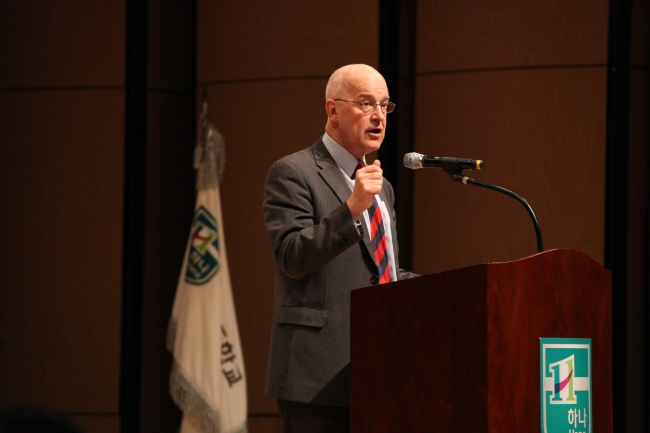Oxford expands research collaboration
University head believes institution should focus on research and education over new campus
By Korea HeraldPublished : April 10, 2013 - 20:05
Top universities are rushing to open overseas branches in emerging countries, especially in Asia and the Gulf region, in pursuit of lucrative markets and untapped talent.
Data showed the total number of overseas campuses worldwide is currently close to 200, almost three times as many as in 2006.
Basking in its history and research competence, Oxford University bucks the trend that risks “ending up with shiny new buildings where little good research happens,” its chief said.
“We prefer focusing on research collaboration rather than building campuses,” Andrew Hamilton, the vice-chancellor of Oxford, told The Korea Herald in a recent interview.
He is the chief manager of the school where the chancellorship is largely a ceremonial post.
Spread over the city of Oxford, it consists of 38 colleges, some of which go back to the 12th century.
It took close to 900 years to build the first Oxford campus, and it may take that long to build a second one, he said.
Data showed the total number of overseas campuses worldwide is currently close to 200, almost three times as many as in 2006.
Basking in its history and research competence, Oxford University bucks the trend that risks “ending up with shiny new buildings where little good research happens,” its chief said.
“We prefer focusing on research collaboration rather than building campuses,” Andrew Hamilton, the vice-chancellor of Oxford, told The Korea Herald in a recent interview.
He is the chief manager of the school where the chancellorship is largely a ceremonial post.
Spread over the city of Oxford, it consists of 38 colleges, some of which go back to the 12th century.
It took close to 900 years to build the first Oxford campus, and it may take that long to build a second one, he said.

“Their architecture is beautiful, and (the colleges) create a community of scholars. We also have one of the best libraries and museums. It will take us a very long time to reproduce those in Korea or anywhere else,” Hamilton said.
“So rather than building campuses, we prefer to focus on research collaborations on very important problems in the 21st century,” he added.
Oxford has established extensive research collaborations around the world throughout its history. In particular, the school has maintained permanent research groups in Asia and Africa for over 20 years, seeking solutions to infectious diseases, such as HIV and malaria.
“People often underestimate the enormous strength Oxford has made in medical and scientific research infrastructure, and often think Oxford as principally humanities and social sciences.”
He noted that Oxford’s medical science division is currently No. 1 in the Times Higher Education ranking.
He visited Seoul last week to enhance partnership with Korean institutions. He signed a memorandum of understanding with the Korea Institute of Energy Research to jointly develop storage materials, carbon materials, solar cells, ocean energy and a road map for future energy sources.
He also visited the Center for Space Astrophysics at Yonsei University to extend research collaborations.
There are some 150 Korean students attending Oxford and their presence is growing, he said. Students from more than 104 countries currently make up one-third of some 20,000 total recruitments.
“Oxford is constantly reinventing itself and constantly making itself relevant for the era that is passing through.”
Oxford recently opened its first school of government that offers a master’s degree program in public policy for future leaders and policymakers.
“We have educated many British prime ministers, and presidents and prime ministers around the world. But we have never had the school of government, and now we do,” Hamilton said.
The program was successfully launched last September with 38 students from around the globe.
“(The school of government) will be now a very important part of education of policymakers around the world,” he added.
Hamilton took the position in 2009 as only the second vice-chancellor to be recruited from outside in its history.
While his role has since been focused more on administrative responsibilities, Hamilton is still passionate about chemistry and enjoys researching and teaching at his lab.
“I still have students working with me on organic chemistry research problems, and for me that is a very important part of my life, because that is why I became a professor in the first place,” he said.
One of his priorities is to increase scholarship provision. “Education mustn’t be the preserve only of the wealthy,” he said.
The lowest-income students currently receive support totaling 10,000 pounds ($15,300) in their first year and some 6,000 pounds each year thereafter.
“We want to try to limit the financial barrier that might exist because of tuition fees (and) the cost of living in Oxford,” he said.
Profile
● Hamilton took office as vice-chancellor of the University of Oxford in 2009. He started his career as assistant professor of chemistry at Princeton University from 1981-1988.
● He also worked at the University of Pittsburgh, and joined Yale University in 1997, where he also served as a provost for science and technology from 2004-2009.
● Hamilton graduated from the University of Exeter in chemistry. He earned his master’s degree from the University of British Columbia and a doctorate from Cambridge.
By Oh Kyu-wook (596story@heraldcorp.com)
-
Articles by Korea Herald


![[KH Explains] Why Korea's so tough on short selling](http://res.heraldm.com/phpwas/restmb_idxmake.php?idx=644&simg=/content/image/2024/05/19/20240519050115_0.jpg&u=20240520081646)
![[News Focus] Mystery deepens after hundreds of cat deaths in S. Korea](http://res.heraldm.com/phpwas/restmb_idxmake.php?idx=644&simg=/content/image/2024/05/17/20240517050800_0.jpg&u=)















![[Today’s K-pop] Seventeen to launch new subunit duo](http://res.heraldm.com/phpwas/restmb_idxmake.php?idx=642&simg=/content/image/2024/05/20/20240520050685_0.jpg&u=)